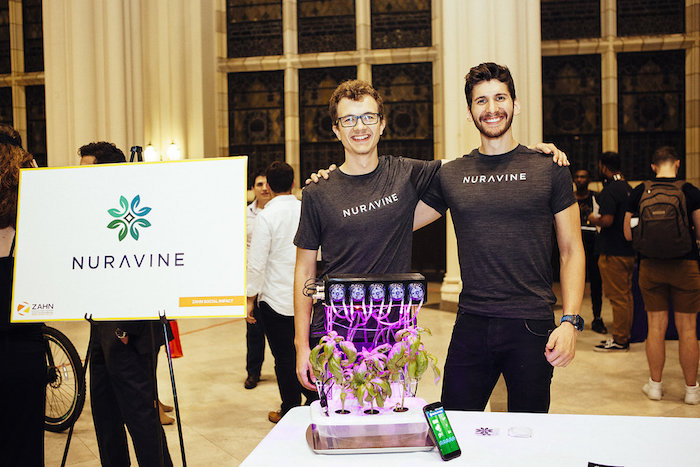Katherine Olives

The good news keeps on coming. Wed like to update you on one of our startups, Nuravine. You may remember them as the food computer of the future, but since then, theyve made a slight pivot. They still have the same dream of building fully automated food-growing systems, but theyre hyper-focused right now on making the first product. They call it Elixir, an auto-nutrient doser and ph-balancer for indoor hydroponics.
Nuravine was recently accepted into The National Science Foundation (NSF) Innovation Corps (I-Corps) National Competition. I-Corps prepares scientists and engineers to extend their focus beyond the university laboratory, and accelerates the economic and societal benefits of NSF-funded, basic research projects that are ready to move toward commercialization. I sat down with Nuravine co-founders Adrian Logan and Alex Babich to talk about what they hope to accomplish over the next few months.
Katherine Olives: First of all, congrats! Were so proud of the Nuravine team. How exactly did this opportunity come about?
Adrian Logan: Thank you! Were very excited. We were part of the I-Corps New York City Regional Node, mostly thanks to Arber Ruci, who is a CCNY grad and entrepreneur. He saw us pitch at one of the Zahn events, and told us that wed be a great fit for the I-Corps program, which hes affiliated with. As part of the program, you can win up to $50,000 to talk to 100 customers. Since we won the Regional Node, were moving on to Nationals.
KO: Thats so exciting! It sounds like a lot of the entrepreneurs in the program are working on a project that hasnt been commercialized yet. Do you find that to be true?
Alex Babich: Yes, most of the startups in the program are research-based. This program is about finding the right market for your project. Usually theyre working on something in a lab that theyre looking to commercialize. In many cases, theyre PhD-level students. It can get a bit intimidating.
AL: But we definitely had a lot of advantages coming out of the Zahn program. Many of the other teams havent been exposed to the entrepreneurial, the business side, or things. We sort of had a leg up on that. We were also comfortable talking to people and getting feedback. People hold very dearly to their technologies, especially if youre doing extensive research on it. And when you put it into the real world, some people dont get it. Its a hard thing to hear. Zahn really prepared us for that. We learned to lose our egos and be open to feedback.
KO: Thats definitely a difficult thing to learn. You get attached to your ideas, you know? So what is the program all about?
AL: I-Corps follows the business model canvas and the lean startup. You learn about how the business model canvas should be–everything on it as a hypothesis. Once you hear enough trues or falses, you can either validate or invalidate what you thought.
KO: And what have you learned so far?
AB: From our interviews, weve learned that we should be targeting the industrial side, as opposed to the in-home market. We initially thought that there were enough industrial products and we wouldnt be competitive. But after talking to people in that space, we realize there is still plenty of room for innovation.
AL: I think its Bert Brodsky that says Find a big market and take a sliver of it. I think thats what we finally realized we should do. These people really need our help. Theyre using clipboards and stuff to keep track of this. Theres so many smart people who have already figured everything out, but there are so many different spaces. Some of them get ignored by the big companies. You should go out and talk to people, and you learn about these spaces.
AB: One of the best experiences was going and visiting the farmers. When you go and visit, you get to see what theyre doing for yourself. Its great to get to know them, ask them questions, they truly have the best insights. We definitely want to see more farmers. Not just indoor farmers, but outdoor as well. As part of this competition, were going to be able to travel all over the US and learn more about farmers. Hopefully well get an even deeper understanding of their problems.
KO: Wow, travelling across the country–that sounds so exciting! Do you have a set plan?
AB: We just started building lists, we wanted to make a list of at least 100 growers, and then started to plan out dates. Well start in Texas–thats where the program starts–but were trying to talk to people all over the place.
AL: Were going to talk to at least 100 direct customers, but we also want to talk to anyone who knows anything about this market.
So if youre one of those people, connect with Nuravine. Theyre looking for hydroponic growers and farmers to go and interview. Email alex@nuravine.com to set up a time to chat.